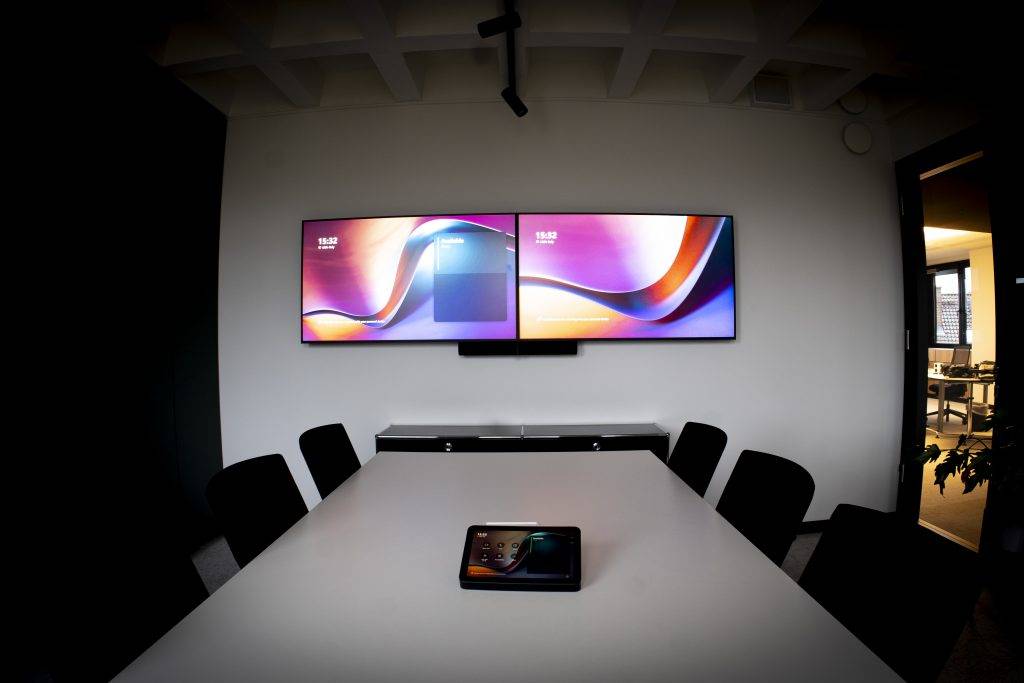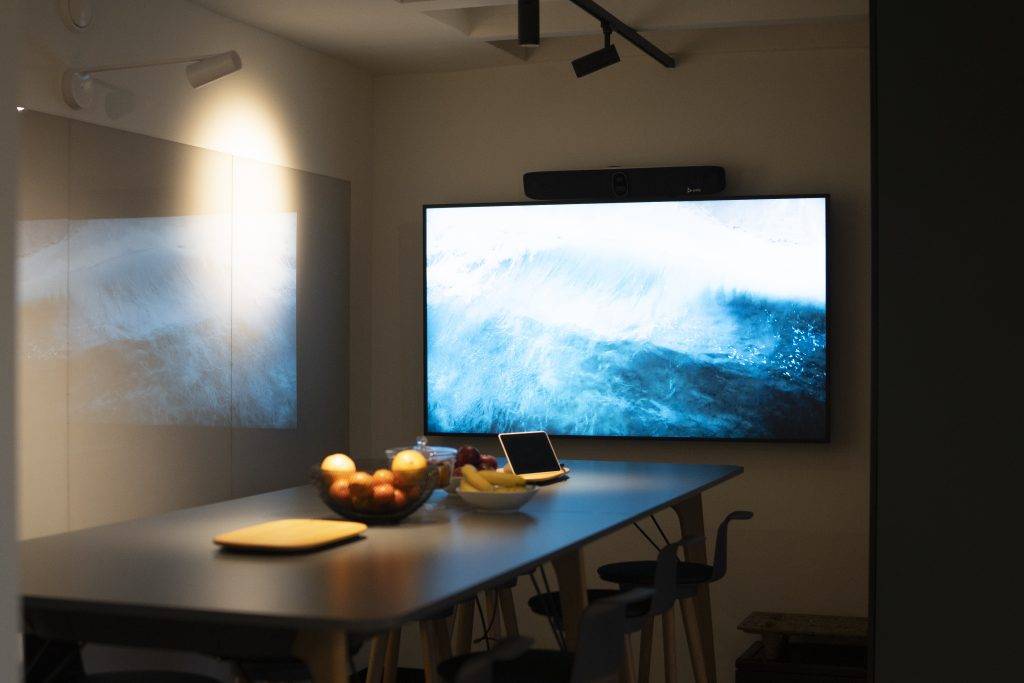
Since COVID-19, there has been a surge in room booking software options. Numerous apps and startups have emerged, each offering varied levels of service quality. However, the underlying issues often run deeper than a quick search in the app store for the first option available. Even if immediate needs are met, the scope for advancement is frequently limited. In this article, we delve into the key advantages that quality room booking software should provide.
Contents:
- Redefining work – not just for managers
- Mastering room booking software challenges – Ensuring seamless operations
- Summarized – the strategic investment
- A glimpse into the future: The evolution of the digital workplace
- Challenges and the future of space management
- What does this mean for you?
In the constantly evolving and expanding global market of workplace solutions, businesses of all sizes are challenged to establish agile and efficient work structures that enhance performance and optimize the work environment for employees. An element that elevates this to a new level is modern room booking software.
Redefining work – not just for managers
Modern room booking software offers more than just a tool for workplace management. While facility managers and team leaders benefit directly from optimizing room management, this technology also brings distinct advantages to individual employees.
Key features of modern room booking software
One of the fundamental features of modern room booking software is its ability to optimize the management of every available space or resource. From small meeting rooms and think tanks to personal workstations and parking spots, employees can plan and access necessary resources through a single platform. The benefits of room booking systems extend beyond coordinating meeting spaces. Regular employees who dedicate their work environments to products, services, and clients experience a significant enhancement in their quality of life through these systems.
Benefits of an effective booking app
An effective booking app enhances the planning of collaborative work sessions, fosters flexibility, and promotes a culture of transparency. This boosts personal efficiency and elevates collaboration to new heights. The right room management software provides tools that tangibly assist employees, such as displaying AV equipment availability or even facilitating catering orders for longer sessions. Additionally, the feature to automatically share room setup images and outcomes post-meetings focuses on output optimization, aligning significantly with the demands of today’s work environment.
The right space for every task
The definition of a ‘workspace’ has evolved, and modern employees require tools that can adapt to these changes. Personalized configurations of room booking solutions empower teams to select spaces based on their specific task and requirement, whether collaborative brainstorming, focused work, or a hybrid session. Planning and booking are the initial steps in a chain of actions within the context of business processes, for instance, at a video conference and meeting room.

Under and overbookings often disrupt or unnecessarily complicate a planned business process, making participation more challenging for remote attendees. While a room management system isn’t insurance, it is a robust aid in seamlessly achieving complex business objectives. The right software indicates room availability and suitability for the planned meeting in terms of size, technical amenities, and location. It significantly reduces the likelihood of under and overbookings, thereby making the initial missteps in a series of misplanning more difficult—or ideally, impossible.
Room booking solutions for overall workplace management
This flexibility and adaptability contribute to the efficient utilization of office space, reducing costs and supporting overall operational management. By providing the entire team with transparency and control over resources, companies can lower operating expenses and enhance the sustainability of their processes. Facility and space management software is often crucial in successful meetings and the smooth, supportive structures that make daily work possible.
However, space management software serves as more than just a reservation tool. It optimizes space utilization, aids in cost reduction, and contributes to monitoring and controlling valuable business investments. By integrating services, strategic decisions can be made, performance metrics can be enhanced, and even office space planning can be optimized by identifying usage trends.
Mastering room booking software challenges – Ensuring seamless operations
Room booking software isn’t just a solution but a tool that needs to be seamlessly integrated into the existing infrastructure. It’s crucial to address the associated challenges and ensure a smooth implementation.
Adapt and overcome
One pivotal success factor in implementing room booking software is how effectively a company manages the changes necessitated by the new process. This includes training employees, change management, and continuous adjustments to ensure the software meets the company’s needs.
Technical requirements and integration
Modern room booking software needs to seamlessly integrate with existing workplace tools and AV systems. This necessitates thorough technical planning and implementation to prevent conflicts with other systems and ensure smooth interaction.
Security and data privacy
Security is paramount regarding room bookings, especially when discussing and presenting confidential information. An appropriate data privacy policy and enforcing security protocols are essential to ensure the software can protect personal data and intellectual property. IT security also plays a crucial role, particularly in organizations where information confidentiality and data protection are compliance-relevant and, therefore, not negotiable.

Modern space management software integrates compatible security protocols to identify and track room usage details. Thoughtfully planned and monitored reservations further reduce energy waste in underutilized spaces. Operating costs decrease, and a systematic booking culture could significantly enhance the sustainability of day-to-day operations.
Summarized – the strategic investment
While challenges exist, using room booking software offers long-term benefits beyond resource management. It’s an investment in the future workplace, strengthening the employer brand, boosting employee motivation and efficiency, and delivering a clear return on investment.
Avoiding negative impacts – well-designed software systems
Choosing the right room booking software is crucial. It should support both individual work styles and collective company goals. Employees will not embrace software that is too complex or not user-friendly and will not serve its purpose.
Choosing sustainability for the future
Room booking systems can significantly impact a company’s sustainability efforts. Reducing unnecessary energy and resource consumption allows companies to minimize their ecological footprint while promoting a culture of sustainability.
Incorporating user perspective
The voice of users, whether management or front-line staff, should be included in the decision-making process to ensure that the selected software meets their requirements. Implementation should involve continuous communication and adaptation to ensure the software’s effectiveness and maximize user comfort.
A glimpse into the future: The evolution of the digital workplace
The implementation of room booking software signifies just the inception of a journey that continually redefines the digital workplace. The future will be characterized by a comprehensive adoption of AR and VR technologies, IoT integrations, and other innovative solutions that cater to tomorrow’s dynamic work environment.
The role of AI and automation
Novel technology like artificial intelligence (AI) and automation integrated into room booking software systems will refine booking processes and resource management. They can assist users in swiftly and effortlessly locating the best available resources while optimizing operations on a vast scale.
Expansion to global dimensions
As businesses and workforces become more global and mobile, room-booking software will also be deployed worldwide. Standardizing systems and processes will enable companies to provide consistent and seamless working environments worldwide.
Challenges and the future of space management
Space management and the technologies driving it are undoubtedly not devoid of challenges. From workforce acceptance to adapting to evolving requirements, a continuous process of fine-tuning and training is imperative. However, with the increasing trend toward hybrid work models and the ongoing evolution of AI-based optimization systems, the future of space management technology is likely to be intricately linked with the future of work itself.

It is intriguing to note that organizations that have integrated this software into their array of modern work tools could emerge as pioneers in a shift in work culture. Those who recognize that room booking is not merely a technical fix but also a valuable contribution to enhancing employee satisfaction and optimizing a company’s most valuable resources driven by people. So, what are the benefits of room booking software solutions and apps?
Comprehensive space management
- Pros: Space management systems significantly enhance facility management efficiency and aid resource administration.
- Cons: Integrating into existing facility management systems can be intricate.
- Solution Approach: Opt for interoperable systems and collaborate closely with providers for seamless integration.
Adapting flexibly to changes
- Pros: Companies can swiftly respond to space utilization and employee needs alterations.
- Cons: Requires continuous software adaptation and updates to meet evolving requirements.
- Solution Approach: Select software providers offering regular updates and customizable solutions.
Enhancing security and control
- Pros: Advanced security features and control options enhance data protection and room reservation management.
- Cons: Data privacy concerns and the need to comply with current data protection laws.
- Solution Approach: Choose software solutions that meet high data protection standards and provide regular updates to align with new regulations.
Optimizing office energy sustainability
- Pros: Intelligent space occupancy and management contribute to reducing energy consumption and associated costs.
- Cons: Measuring and verifying actual savings from sustainability measures can be challenging.
- Solution Approach: Employ energy monitoring tools to track consumption and evaluate the effectiveness of sustainability initiatives.
Improving user experience
- Pros: Enhanced booking and user experience significantly elevate workplace satisfaction.
- Cons: Potential resistance to change when introducing new booking systems.
- Solution Approach: Gather and consider user feedback to enhance acceptance and satisfaction.
Balancing bookings: Avoiding overbooking and underbooking
- Pros: Minimize the risk of unused spaces or double bookings, leading to more efficient use of available rooms.
- Cons: Dependence on the accuracy of user inputs and the risk of technical errors.
- Solution Approach: To boost accuracy and reliability, utilize automated reminders, presence confirmation through sensors and manual verifications, and regular system maintenance.
Strengthening collaboration
- Pros: Efficient room reservations and management enable employees to work more productively and simplify collaboration.
- Cons: Initial familiarization time and employee training efforts may initially impact productivity.
- Solution Approach: Implement intuitive user interfaces and provide comprehensive training to minimize the learning curve.
Justifying the investment (building the business case)
- Pros: Optimizing space utilization results in immediate cost savings and a notable return on investment (ROI) enhancement.
- Cons: Initial investments and potential ongoing costs for software updates and maintenance.
- Solution Approach: Conduct a comprehensive cost-benefit analysis before implementation to weigh long-term savings against initial expenses.
Regardless of company size or industry, space management technology is bound to influence your work life and practices. Therefore, early implementation consideration backed by full company support is advisable to achieve smooth integration and maximum benefits.
What does this mean for you?
Therefore, implementing room booking software is a strategic component in a changing corporate landscape, enhancing both productivity and work quality. By assessing and addressing challenges in advance and carefully selecting and integrating the appropriate software, the modern office can transform into a hub of innovation, productivity, and satisfaction—benefiting all involved.